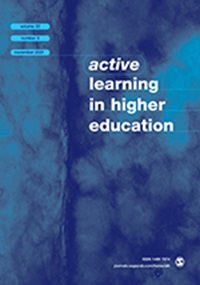Use of interactive storytelling trailers to engage students in an online learning environment
IF 3.8
1区 教育学
Q1 EDUCATION & EDUCATIONAL RESEARCH
引用次数: 2
Abstract
Lack of student engagement in online learning is reported as the major challenge contributing to poor academic performance and completion rates. When transforming an in-person undergraduate remote sensing course to online, this study implemented interactive storytelling lecture trailers (ISLTs) as a tool to effect changes in the realms of behavioral, cognitive, emotional, and student-instructor engagement. We collected survey data to examine students’ own perception of how ISLTs impacted their online learning, and analyzed students’ course participation and performance on tests. Results indicated that ISLTs enhanced some aspects of students’ behavioral engagement such as page views, effectively engaged students’ emotions when viewing ISLTs, and improved student-instructor engagement. Regarding cognitive engagement, ISLTs were able to improve short-term learning skills like remembering and applying levels of thinking. A majority of students recognized that ISLTs enhanced their learning experience and made learning more accessible, while a few considered them burdensome and overwhelming. However, there was no clear evidence indicating that ISLTs enhanced participation or promoted students’ emotional engagement in the follow-up lectures. Further, the improvement of student-instructor engagement we observed through quantitative data analysis lacked representative qualitative support. In summary, this study demonstrates the utility of ISLTs as an online learning engagement tool for stimulating students’ interest and improving their performance in lower levels of cognitive thinking. Further work is required to explore ways to further enhance students’ participation and emotional engagement throughout the semester and confirm the usefulness of ISLTs for student-instructor engagement.使用交互式讲故事预告片让学生参与在线学习环境
据报道,学生缺乏对在线学习的参与是导致学习成绩和完成率低下的主要挑战。在将本科生的现场遥感课程转变为在线课程时,这项研究采用了互动讲故事的讲座预告片(ISLT),作为一种工具,来影响行为、认知、情感和学生-教师参与领域的变化。我们收集了调查数据,以检验学生自己对ISLT如何影响他们的在线学习的看法,并分析了学生的课程参与度和考试成绩。结果表明,ISLTs增强了学生行为参与的某些方面,如页面浏览,有效地参与了学生在观看ISLTs时的情绪,并提高了学生-教师的参与度。在认知参与方面,ISLT能够提高短期学习技能,如记忆和应用思维水平。大多数学生认识到ISLT增强了他们的学习体验,使学习更容易进行,而少数学生则认为ISLT繁重且难以负担。然而,没有明确的证据表明ISLT增强了学生对后续讲座的参与或促进了学生的情感参与。此外,我们通过定量数据分析观察到的学生-教师参与度的提高缺乏代表性的定性支持。总之,本研究证明了ISLT作为一种在线学习参与工具的效用,它可以激发学生的兴趣,提高他们在较低认知思维水平上的表现。需要进一步的工作来探索如何在整个学期进一步加强学生的参与和情感参与,并确认ISLT对学生-教师参与的有用性。
本文章由计算机程序翻译,如有差异,请以英文原文为准。
求助全文
约1分钟内获得全文
求助全文
来源期刊

Active Learning in Higher Education
EDUCATION & EDUCATIONAL RESEARCH-
CiteScore
13.20
自引率
12.00%
发文量
31
期刊介绍:
Active Learning in Higher Education is an international, refereed publication for all those who teach and support learning in higher education (HE) and those who undertake or use research into effective learning, teaching and assessment in universities and colleges. The journal is devoted to publishing accounts of research covering all aspects of learning and teaching concerning adults in higher education. Non-discipline specific and non-context/country specific in nature, it comprises accounts of research across all areas of the curriculum; accounts which are relevant to faculty and others involved in learning and teaching in all disciplines, in all countries.
 求助内容:
求助内容: 应助结果提醒方式:
应助结果提醒方式:


